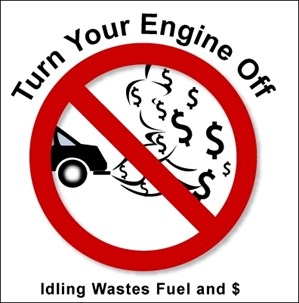
The B.C. Climate Action Toolkit says anti-idling campaigns help shift behaviour and encourage people to learn about other ways they can do their part in reducing climate change.
Image Credit: SOURCE/ B.C. Climate Action Toolkit
February 26, 2013 - 10:45 AM
By Charlotte Helston
Drivers could get ticketed next year if they leave their vehicles idling for longer than three minutes. And while refueling may seem punishment enough, the offense would carry a minimum $250 fine.
The city passed a draft anti-idling bylaw presented by Clint Kanester, manager of bylaw enforcement, on Monday. Kanester said other cities, like Kamloops, already enforce idling bylaws to address noise complaints, promote air quality and contribute to long term sustainability.
Coun. Juliette Cunningham was surprised to hear the bylaw wouldn't give the city any carbon credits. "I thought we'd get some credits for that... the city does because (they have) a comprehensive program with monitoring devices," she told InfoTel News. City staff have a GPS system in their cars that beeps when they have been idling for three minutes, and this initiative counts for carbon credits.
For Cunningham, the absence of carbon credits doesn't negate the positive impact the bylaw would have.
"It does raise an awareness, (it) says we are an anti-idling community. All these little things help to raise the awareness," she says. "I think we sometimes just forget the impact (idling) has not only on the environment but also on disturbing your neighbour."
Kanester said he recently witnessed a vehicle left idling for three hours near Walmart. Less serious, but still affected by the proposed bylaw, are drivers who warm up their vehicles by leaving them running. The B.C. Climate Action Toolkit says it's a myth that idling warms the engine; they say the best way to warm up every part of a vehicle—the tires, transmission, wheel bearings—is to drive it.
Kanester said council could modify the idling times by season to allow longer periods in the winter, but that for consistency, it would be better to keep the maximum idling time at three minutes year round.
The B.C. Climate Action Toolkit says that if Canadians avoided idling for three minutes every day, carbon dioxide emissions would be reduced by 1.4 million tonnes annually. That would be the equivalent of about 320,000 cars off the road for the entire year.
To contact the reporter for this story, email Charlotte Helston at chelston@infotelnews.ca or call (250)309-5230
News from © iNFOnews, 2013